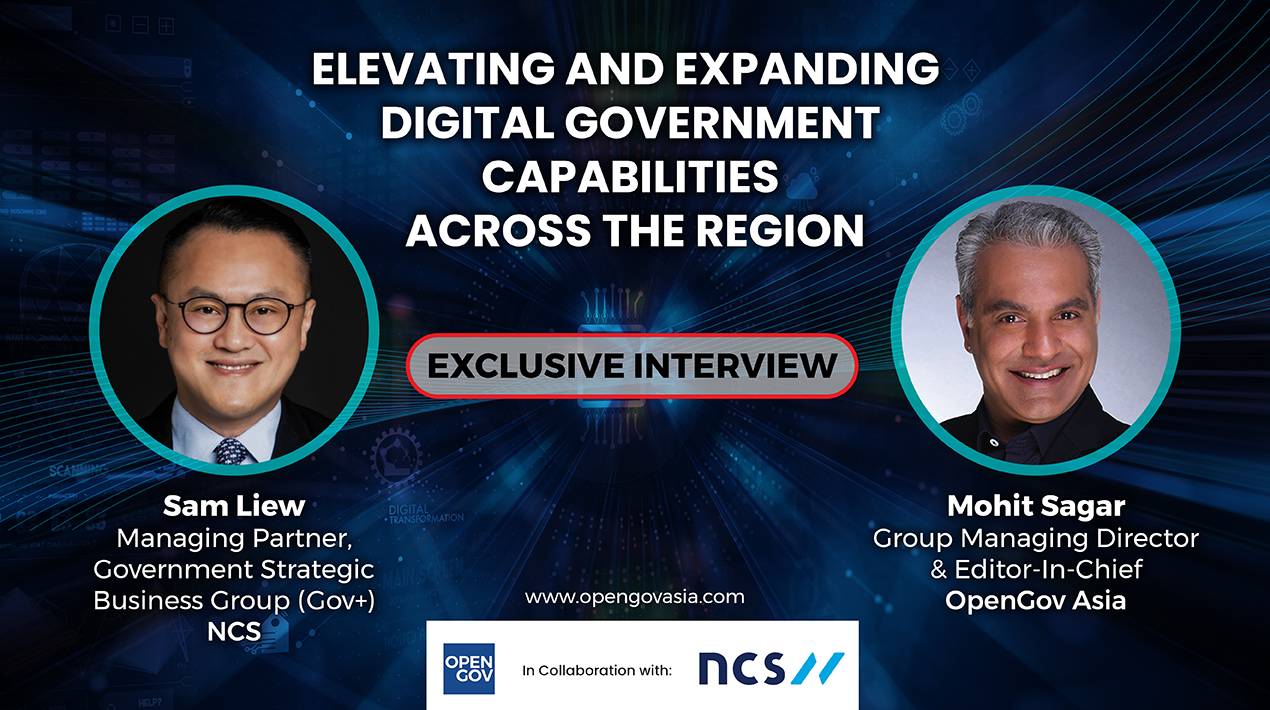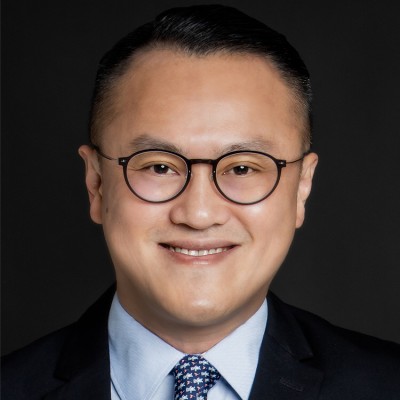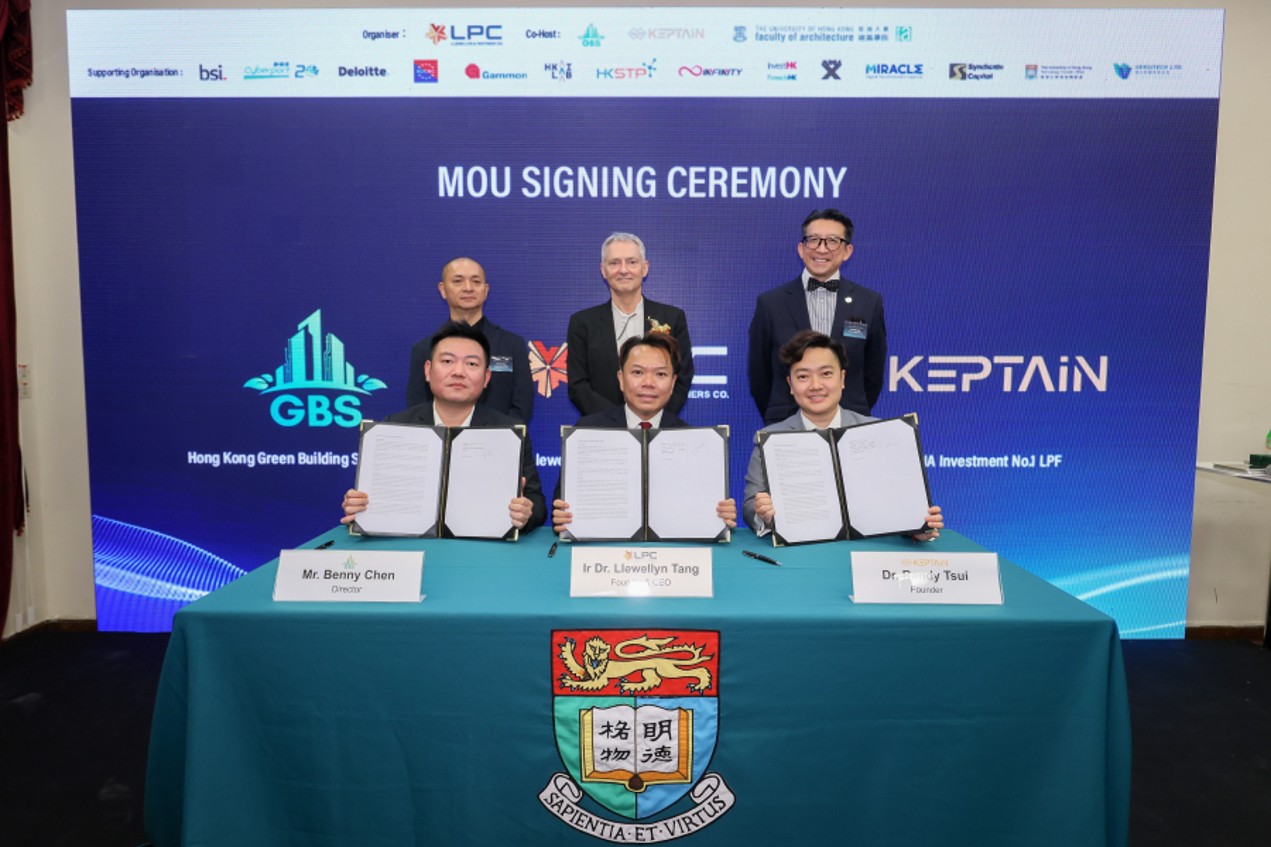
OpenGov had the pleasure of speaking to Sam Liew, Managing Partner, Government Strategic Business Group, NCS. Keeping in mind the present realities, Mohit Sagar, Group Managing Director and Editor-in-Chief, discussed a range of topics from Sam’s driving passions to the strategic plans of NCS to the adoption of Artificial Intelligence (AI) in Singapore.
 Looking to get a better understanding of what motivates Sam, the conversation started with a dive into the drivers that got Sam into the organisation. NCS has been actively involved in Singapore for 40 years and the mission that he is gearing himself towards is to grow and make NCS a major regional IT services company.
Looking to get a better understanding of what motivates Sam, the conversation started with a dive into the drivers that got Sam into the organisation. NCS has been actively involved in Singapore for 40 years and the mission that he is gearing himself towards is to grow and make NCS a major regional IT services company.
Sam is genuinely committed to the vision of building a leading APAC Technology Services company headquartered out of Singapore. He is a firm believer in NCS’ business overall and is confident that the business he leads – Government Strategic Business Group (also known as Gov+) – can be a catalyst and a vehicle for change in the region.
Gov+, Sam explains, aims to improve the lives of citizens and advance communities by using technology to create a vibrant society covering Public Service, Defence, Homeland Security and Government Global Business – the four pillars of Gov+.
Its primary mission is to build up NCS’ digital government portfolio and drive collaboration efforts to propel NCS as the go-to digital catalyst for governments and smart cities across the Asia Pacific. The intent is to help government agencies digitalise the core of public services to enable holistic public service transformation, to advance communities and support enterprises.
The current environment of the pandemic is a stark reminder of the need to digitalise in an ever-increasing VUCA world. Gov+ helps drive public sector practice and contributes to helping governments digitalise to offer better citizen e-services and support the overall business.
“Technology and digitalisation is a revolution that is here to stay,” Sam is convinced. “If technology is harnessed well, it can help governments provide support for communities and enterprises, especially so in these times where all the sectors are disrupted, either by COVID-19, digitalisation or technological improvements.”
Mohit agreed that the world is truly in a state of rapid digitisation and that governments need to get on the digitalisation journey to stay relevant. He was curious about what Sam thought of as the key engines and the benchmarks for success in an initiative like Gov+.
Results and target are the outcomes of a solid, well-thought-out game plan, Sam says. NCS and Gov+ have established a set of foundational strategies:
- Double down and grow the Singapore Public Sector which remains a priority for NCS and Gov+
- Digitalise end-to-end Public Sector systems, enabling holistic public service transformation and bringing impact to the communities
- Grow Singaporean Core technology, talents and expertise which are particularly important for a small country like Singapore
- Focus on Pan APAC expansion by scaling Digital and Smart Nation assets to the APAC region and harvesting back knowledge and capabilities into assets
Mohit observes that the past 2 years have seen companies deploy “band-aid technology” to deal with the challenges of COVID-19. As things settle down, companies will need to look at the lasting changes that the pandemic has left in its wake and address those with more permanent solutions and smarter approaches. For instance, the agile methodology has become the true foundation and building blocks of governments. There are, of course, a myriad of problems and issues, so the fundamental question is: how do people know what to prioritise?
The question is absolutely vital, and while there are varying opinions, Sam believes that the focus should be on adopting cloud technologies for non-sensitive workloads, moving towards application containerisation, and modernisation of both infrastructure and applications. This will allow governments to deploy quicker, drive performance faster and build products more swiftly because they are in containers; and are components that can be assembled on the fly.
Beyond a doubt, there is a need to continuously drive multi-speed development and explore new technology and solutions as they become available. This is where and why he shares Mohit’s sentiment on agile methodology.
A perfect example of more efficient innovation is the development of DevSecOps and Continuous Integration and Continuous Delivery (CICD) capabilities. DevSecOps provides security as well as developing templates for the upstream developers in the design, instead of leaving the discovery of mistakes for the downstream. CICD on the other hand is a tested and proven practice for software deployment, automated testing and code, etc.
Sam also recommends adopting emerging technology solutions such as AI, 5G and Digital Twin. Along with Cloud adoption, organisations need to start embracing these emerging technology, driving and identifying use cases in their agencies.
In a segue to the topic of wider adoption of cutting-edge technology, Mohit was keen to know how NCS plans to share its wins and learnings in the terms of establishing a data-driven culture with the organisations they work with.
“Data is indeed the new oil in this Digital Age,” Sam is convinced. “Even a naysayer will say that organisations need more data insights to make accurate decisions.”
NCS have practices focused on Data Analytics, Big Data and Platforms, Artificial Intelligence and Data Science. NCS’ teams in these practices are deployed to clients’ projects to solve various data issues and to obtain specific actionable information and derive intelligent insights.
NCS deploys a Digital Inside and Digital Outside framework to help clients determine their prioritisation goals and implement solutions to match specific requirements. Moreover, it is important to identify what data sets that organisations should be working from – for instance some data that tackle efficiency is more inward-looking, while other data is outward in driving expansion into new markets, new products, new sectors and new customers.
While big data, analytics and the generation of actionable insights, AI, Mohit suggests, even in Singapore, is still in its early stages of deployment and adoption. “How can we help Singapore become mainstream in that space?” he is eager to learn.
Sam shared that NCS is already embedding AI techniques into the work they do. NCS has several AI categories in which they develop their solutions: Anomaly Detection, Predictive Analytics, Resource Optimisation, Intelligent Processing to name a few. The premise of AI inclusion is to make unbiased decisions or generate intelligence based on data. Without AI, people will be making a decision based on experience rather than data-driven insights and predictive outcomes.
Steering the conversation towards the wider plans of NCS, Mohit inquired about strategies that NCS has to entrench the company as a regional force.
NCS does have a focused Pan APAC strategy to expand the Gov+ business, Sam acknowledges. In Australia for instance, they launched the NCS NEXT Cloud Centre of Excellence (CoE) in Melbourne. That was part of NCS’ regional expansion strategy into Australia, following the partnership with Optus Enterprise in December 2020 to bring integrated ICT and digital services to Australian clients across a wide range of industries and government sectors. The CoE will also facilitate expertise exchange and deepen collaboration between the teams in Singapore and Australia, helping both cities build cloud expertise in a competitive talent market.
Another strategy is through specific acquisitions to grow capabilities. Sam explained that NCS has recently acquired some companies which will accelerate expansion across Asia-Pacific:
- Riley – a leading Australian cloud-based solutions consultancy that offers a comprehensive portfolio of services in cloud-native transformation, data supply chain, and cloud operations.
- ClayOPS – a Singapore-based data analytics and consulting services firm that specialises in helping organisations improve enterprise performance through data and data analytics
- Velocity Business Solutions – a Hong Kong-based data analytics firm that provides a full suite of data analytics consulting and implementation services including design, development, support, and enablement.
- NCS also made a majority investment in Eighty20 Solutions – an Australian cloud transformation specialist.
Finally, NCS takes on regional expansion by leveraging the inherent advantages of a subsidiary under the Singtel Group. Through the partner ecosystem, they have accumulated knowledge from delivering numerous complex and large-scale government projects in Singapore’s digitalisation roadmap.
While technology and infrastructure are two pillars of digital transformation, Mohit opines that for digitalisation to achieve business objectives, it must involve people and culture. As Sam agrees with this, Mohit asks for his thoughts on how to make people more effective in terms of skills, collaboration, partnerships, both internally and externally.
Equipping people with digital capabilities to help enable economic development and growth is a must, believes Sam. People are the centre, drivers and ultimate beneficiaries of this journey; and as such, they must be equipped and prepared to both rollout and benefit from digital transformation.
At NCS, they create opportunities and training for employees to develop skills across any of the 53 specialisations or practices. Sam is keen to see employees go deeper and specialise in the domains that they prefer. To that end, he is prepared to facilitate and lead these endeavours.
NCS will bring people of different specialisations into the same team to deliver services to customers. The organisation is charting a course for growth through talent strategies to relentlessly attract, develop and retain the best people to lead and innovate for tomorrow.
He observes that today’s workforce want specialisation but do not want to be trapped in a particular role for too long. To address this, NCS has created a unique initiative that offers a transformative learning experience – DoJo. Taken from the Japanese, “Do” means a way or a pursuit and “Jo” means a place.
The vision for the platform is a place that people can:
- have an immersive learning experience
- pursue and practice: two-way interaction where our people can come together to “pursue and practice” the NCS way and learn together
- avail mentorship: employees taking lessons learnt from various projects and sharing, discussing and creating best practices so that both employees and clients can benefit
- offer (reverse) mentorship: senior leaders learning from the younger staff
To round up the conversation, Mohit brought the spotlight back on Sam, inquiring about his leadership, specifically his objectives and expectations of his team.
Developing a sustainable growing business in NCS is key to his vision, reveals Sam. A strong advocate of the digital industry, growing industry capabilities and nurturing talents is integral to its success. He “finds immense joy in mentoring talents, encouraging digital professionals to broaden their skills and keeping up to date on emerging digital technologies”.
Sam views expectations from two perspectives – his expectation of each individual and their expectation of him as their leader. As a leader, he believes in bringing out the best in his teams and the people he works with. This includes empowering and enabling them with the right level of autonomy to “reach for the sky”.
Apart from that, practising open communications that cultivate mutual respect and trust is something that he places great stock in and affirms. At the end of the day, he believes that every individual is accountable for their own goals and should all stay focused on achieving them.
Looking ahead, Sam offers three milestones that he is confident would define success in NCS: Growth in Financial Results (sustainable Revenue growth), Growth in People (expertise, engagement, sustainable careers) and High Customer Satisfaction (based on quality delivery).
Energised by the bold new vision of a Pan APAC expansion of Gov+, Sam looks forward to leading NCS into becoming a force of change in Singapore and beyond. Ultimately, he hopes NCS will grow to become a major regional IT services company that everyone loves to be associated with.





















